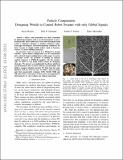| dc.contributor.author | Becker, Aaron | |
| dc.contributor.author | Demaine, Erik D. | |
| dc.contributor.author | Fekete, Sandor P. | |
| dc.contributor.author | McLurkin, James | |
| dc.date.accessioned | 2015-11-23T17:27:58Z | |
| dc.date.available | 2015-11-23T17:27:58Z | |
| dc.date.issued | 2014-05 | |
| dc.identifier.isbn | 978-1-4799-3685-4 | |
| dc.identifier.uri | http://hdl.handle.net/1721.1/100006 | |
| dc.description.abstract | Micro- and nanorobots are often controlled by global input signals, such as an electromagnetic or gravitational field. These fields move each robot maximally until it hits a stationary obstacle or another stationary robot. This paper investigates 2D motion-planning complexity for large swarms of simple mobile robots (such as bacteria, sensors, or smart building material). In previous work we proved it is NP-hard to decide whether a given initial configuration can be transformed into a desired target configuration; in this paper we prove a stronger result: the problem of finding an optimal control sequence is PSPACE-complete. On the positive side, we show we can build useful systems by designing obstacles. We present a reconfigurable hardware platform and demonstrate how to form arbitrary permutations and build a compact absolute encoder. We then take the same platform and use dual-rail logic to build a universal logic gate that concurrently evaluates AND, NAND, NOR and OR operations. Using many of these gates and appropriate interconnects we can evaluate any logical expression. | en_US |
| dc.description.sponsorship | National Science Foundation (U.S.) (CPS-1035716) | en_US |
| dc.language.iso | en_US | |
| dc.publisher | Institute of Electrical and Electronics Engineers (IEEE) | en_US |
| dc.relation.isversionof | http://dx.doi.org/10.1109/ICRA.2014.6907856 | en_US |
| dc.rights | Creative Commons Attribution-Noncommercial-Share Alike | en_US |
| dc.rights.uri | http://creativecommons.org/licenses/by-nc-sa/4.0/ | en_US |
| dc.source | arXiv | en_US |
| dc.title | Particle computation: Designing worlds to control robot swarms with only global signals | en_US |
| dc.type | Article | en_US |
| dc.identifier.citation | Becker, Aaron, Erik D. Demaine, Sandor P. Fekete, and James McLurkin. “Particle Computation: Designing Worlds to Control Robot Swarms with Only Global Signals.” 2014 IEEE International Conference on Robotics and Automation (ICRA) (May 2014). | en_US |
| dc.contributor.department | Massachusetts Institute of Technology. Computer Science and Artificial Intelligence Laboratory | en_US |
| dc.contributor.department | Massachusetts Institute of Technology. Department of Electrical Engineering and Computer Science | en_US |
| dc.contributor.mitauthor | Demaine, Erik D. | en_US |
| dc.relation.journal | Proceedings of the 2014 IEEE International Conference on Robotics and Automation (ICRA) | en_US |
| dc.eprint.version | Original manuscript | en_US |
| dc.type.uri | http://purl.org/eprint/type/ConferencePaper | en_US |
| eprint.status | http://purl.org/eprint/status/NonPeerReviewed | en_US |
| dspace.orderedauthors | Becker, Aaron; Demaine, Erik D.; Fekete, Sandor P.; McLurkin, James | en_US |
| dc.identifier.orcid | https://orcid.org/0000-0003-3803-5703 | |
| mit.license | OPEN_ACCESS_POLICY | en_US |
| mit.metadata.status | Complete | |
